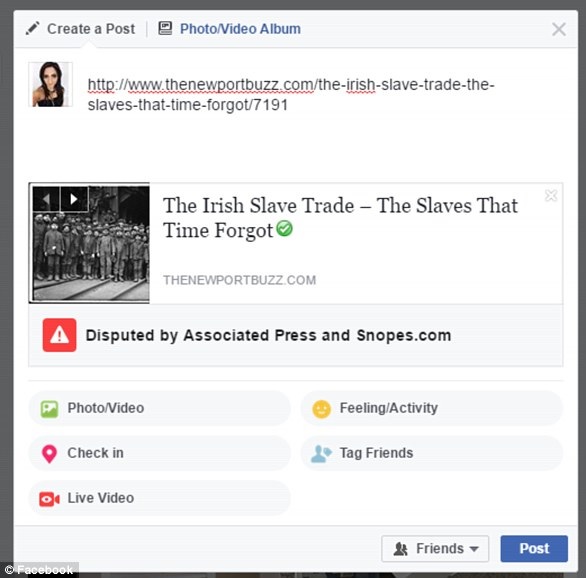Facebook has launched a new feature designed to discourage users form sharing false or “disputed” news.

The new tool works by sending a pop-up window to mobile and desktop users they attempted to share articles on Facebook that were deemed inaccurate by third-party fact-checkers.
The feature is part of Facebook’s program to work with third-party fact-checking organisations that are have agreed to Poynter’s International Fact Checking Code of Principles.
Facebook itself will not decide what is real and what is considered fake.
Instead, it is enlisting The Poynter Institute, a Florida journalism school, to sift through content.
The Poynter Institute is the host of the International Fact Checking Network which bills itself as a ‘global alliance of fact checkers’.
The new alert system appeared when many users tried to share a story that made false claims about people from Ireland were forced to come to the US as slaves. When users attempted to share the link they were instantly met with an alert
How it works
The new alert system appeared when many users tried to share a story that made false claims about people from Ireland were forced to come to the US as slaves. When users attempted to share the link they were instantly met with an alert
Its members include ABC News, Politico, The Associated Press and Snopes.com and The Washington Post.
The Network receives funding from various sources including the Arthur M. Blank Family Foundation, the Duke Reporters’ Lab, the Bill & Melinda Gates Foundation, Google, the National Endowment for Democracy, the Omidyar Network, the Open Society Foundations and the Park Foundation.
All describe themselves as non-profit organizations.
The Network will rely on its ‘code of principles’ to decipher between fake and real content. It asks signatories adhere to the following principles;
– Non-partisanship and fairness
– Transparency of sources
– Transparency of funding and organization
– Transparency of methodology
– Commitment to open and honest corrections
